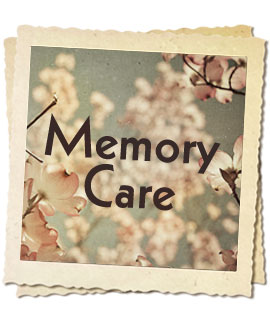According to the Alzheimer’s Association (alz.org), Alzheimer’s disease is currently the sixth-leading cause of death in the United States while also the only cause of death among the top ten in the United States that cannot be prevented, cured or even slowed. More than 5 million Americans are currently living with the disease, and every 67 seconds someone in the U.S. will develop Alzheimer’s. These are incredibly stark statistics, and dementia-related issues are an epidemic that will continue to grow among our loved ones and community members.
With so many people at different places on the spectrum and the extent of its far reaching effects, it makes sense that there are a wealth of options and resources available for those who are experiencing memory loss as well as their loved ones. Among these, all have one thing in common: quality of life for all who are affected. Continuing to live a meaningful life full of love and memories in a safe environment is crucial for those with dementia or Alzheimer’s disease.
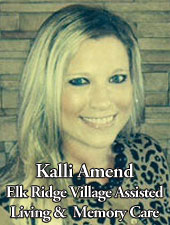 “Not everyone who has dementia has Alzheimer’s,” explains Kalli Amend of Elk Ridge Village Assisted Living and Special Memory Care. “Alzheimer’s is a disease and the most common form of dementia. Dementia is an impairment of thinking and memory that interferes with a person’s ability to do things which he or she previously was able to do. It is important to know what to look for when it comes to your loved one and their memory problems so you can talk to your doctor and get timely and appropriate care for their safety and health wellbeing. Elk Ridge Village offers an Alzheimer’s support group that meets on the third Monday of every month. We also have specially trained staff in Alzheimer’s and dementia, licensed nursing staff and a broad physician base. This help will benefit your loved one’s health and wellness and also help keep them safe. It also will provide education for you and your family.”
“Not everyone who has dementia has Alzheimer’s,” explains Kalli Amend of Elk Ridge Village Assisted Living and Special Memory Care. “Alzheimer’s is a disease and the most common form of dementia. Dementia is an impairment of thinking and memory that interferes with a person’s ability to do things which he or she previously was able to do. It is important to know what to look for when it comes to your loved one and their memory problems so you can talk to your doctor and get timely and appropriate care for their safety and health wellbeing. Elk Ridge Village offers an Alzheimer’s support group that meets on the third Monday of every month. We also have specially trained staff in Alzheimer’s and dementia, licensed nursing staff and a broad physician base. This help will benefit your loved one’s health and wellness and also help keep them safe. It also will provide education for you and your family.”
She adds, “It is important to get a health care and financial Power of Attorney in place before your loved one is unable to make those decisions. It is also a good idea to learn the signs and symptoms of Alzheimer’s and dementia so that you are aware of the level of care that is appropriate, and look into long term care insurance and other coverage options before the diagnosis. If at all possible, make the decision to move to a memory care or assisted living/retirement community before the disease progresses too far because prolonging it will make the transition harder for everyone involved. Also, talk frequently to physicians and other family members. A geriatric assessment is helpful for the family to know what stage of memory loss their loved one is experiencing.”
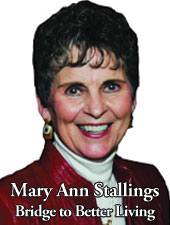 Mary Ann Stallings of Bridge to Better Living also emphasizes the importance of finding resources that can provide the answers to the questions you have:
Mary Ann Stallings of Bridge to Better Living also emphasizes the importance of finding resources that can provide the answers to the questions you have:
“How DO we deal with our loved one who is no longer the person we once knew? What should we do? Where should we go? They will be angry with us if we move them, but the caregiver who is up 24/7 is wearing out and we need to think of them, too. Are we making the right move?”
These are many of the questions families who are affected by the dreaded disease have when they meet with Bridge to Better Living. Dementia and Alzheimer’s are the hardest situations because of the emotional and guilty feelings the families often have.
Bridge to Better Living is able to walk the family through the process of finding the perfect fit for their loved ones at NO cost. This includes the important first contact, tours, and being their own personal representative. After the families are shown various options Bridge to Better Living is able to provide a comparison database. It is very important a person with dementia or Alzheimer’s hopefully makes only one move. Our services narrow down the communities that will fit their needs and we provide access to:
• Actual provided amenities and services • Hands-on information
• Prices, locations, sizes of apartments • Support before, during, and after the move
We are there to listen, to provide emotional support, and refer to community resources for support before, during the transition and after their loved one has moved. Having ‘been there and done that’, we realize how important it is to have someone beside you on this journey.”
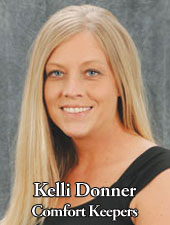 For those who wish to stay in their own homes as long as possible, and for caregivers who are in need of respite, in-home assistance is another incredibly useful option that is available. “In-home care has become a top choice for seniors,” says Kelli Donner of Comfort Keepers. “Most seniors wish to remain in their own homes for as long as possible, living in a familiar place where they are most comfortable. Age-related memory loss is common and is not to be confused with cognitive disorders, such as Alzheimer’s disease or dementia, which are more severe. Though slight cognitive decline is expected as a person gets older, there are ways to be proactive and prevent or delay memory loss from happening. For seniors who have begun to experience memory loss/dementia, home care can be an excellent solution to prevent disruption in their lives and provide seniors with the opportunity to remain at home, where they have a familiar place of reference.
For those who wish to stay in their own homes as long as possible, and for caregivers who are in need of respite, in-home assistance is another incredibly useful option that is available. “In-home care has become a top choice for seniors,” says Kelli Donner of Comfort Keepers. “Most seniors wish to remain in their own homes for as long as possible, living in a familiar place where they are most comfortable. Age-related memory loss is common and is not to be confused with cognitive disorders, such as Alzheimer’s disease or dementia, which are more severe. Though slight cognitive decline is expected as a person gets older, there are ways to be proactive and prevent or delay memory loss from happening. For seniors who have begun to experience memory loss/dementia, home care can be an excellent solution to prevent disruption in their lives and provide seniors with the opportunity to remain at home, where they have a familiar place of reference.
For many families, it is a privilege and joy to be able to provide dementia care and other Alzheimer’s care for their senior loved-ones. This gives the family the opportunity to spend time together. However, taking care of seniors with dementia can be draining on the entire family because of the constant care and attention that is required for this specific care. Comfort Keepers, the in-home senior care service provider, is proud to offer dementia care for seniors. Caregivers, the friendly and professional Comfort Keepers, are highly and specifically trained to provide care for seniors with dementia.
For every senior, Comfort Keepers prepares a customized care service plan that details exactly what care each senior requires and describes exactly what services Comfort Keepers will provide. Caregivers can provide a variety of services: ranging from weekly visits of 2 hours to 24 hour in-home care live-in service. Comfort Keepers works to make sure every senior is safe and sound as they live independently in their own home. Comfort Keepers also offers several technology solutions in addition to in home care that gives families peace of mind while they are not with their loved one.”
It can be a long journey when caregiving for someone with memory issues. Researching what the government offers, financial affairs and legal documents that are needed can help when you find yourself making decisions for someone. Care Consultants for the Aging offers information on these topics and other senior services that might be utilized in their ElderCare Resource Handbook. It can be viewed for free at www.careconsultants.com and ordered in print too.
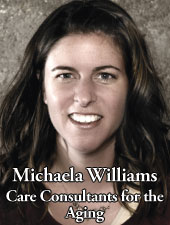 “Care Consultants offers two main services to support those with memory issues, explains Michaela Williams of Care Consultants for the Aging. “Our homecare can find caregivers that can help seniors live safely and assist with activities of daily living. Caregivers can be found to work anywhere from one to twenty four hours a day. We also produce an ElderCare Resource Handbook which provides a complete listing of senior services in the Omaha, Lincoln and Des Moines metro areas.
“Care Consultants offers two main services to support those with memory issues, explains Michaela Williams of Care Consultants for the Aging. “Our homecare can find caregivers that can help seniors live safely and assist with activities of daily living. Caregivers can be found to work anywhere from one to twenty four hours a day. We also produce an ElderCare Resource Handbook which provides a complete listing of senior services in the Omaha, Lincoln and Des Moines metro areas.
Care Consultants can offer both medical and non-medical assistance through the caregivers we refer. The care is client directed and can be used as often as needed. Caregivers can help clients with many things such as bathing, toileting, medication, dressing and making meals. As people progress through their memory disease the reality of them needing help with personal care becomes greater.”
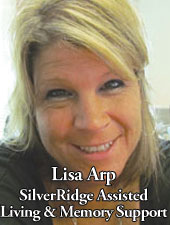 Being able to judge whether a higher level of care, or a move to a memory care facility, is needed is something that is difficult for many. Taking advantage of local resources for guidance can prove to be extremely helpful in making these tough decisions. Lisa Arp of SilverRidge Assisted Living speaks to the importance of structure and safety in the living environment of someone who is affected by dementia or Alzheimer’s disease:
Being able to judge whether a higher level of care, or a move to a memory care facility, is needed is something that is difficult for many. Taking advantage of local resources for guidance can prove to be extremely helpful in making these tough decisions. Lisa Arp of SilverRidge Assisted Living speaks to the importance of structure and safety in the living environment of someone who is affected by dementia or Alzheimer’s disease:
“SilverRidge Assisted Living in Gretna is as structured an environment as you can possibly get. We have two cottages which have 14 private studio apartments per cottage, which provides for a high resident to staff ratio. Each of the cottages is secured in and out from all exits–you need a code to enter and exit and the courtyards are secured so residents can go outside without the possibility of wandering. Most importantly, the studio apartments are all equipped with motion sensors so the staff knows when the resident exits or enters his/her room, bed or bathroom. Furthermore, our staff has quarterly meetings/classes with the Alzheimer’s Association. This keeps us updated on any new research and helps the staff with specific scenarios they have encountered involving difficult residents as far as behaviors or changes in health or demeanor. Understanding that every resident is different–that no resident has the same diagnosis, behaviors, or areas of the brain that are affected–is a huge part of understanding the disease.
At SilverRidge we work together with family members to try and help them understand what their loved one is going through, to help them realize that dementia-related behaviors are nobody’s fault, to take one day at a time and to have patience. Being there for family members, educating them, and just lending an ear to frustrations and letting them know the guilt they are feeling is natural are just some of the ways we try to help everyone through it. That is why education and early detection are key. Waiting too long is a common thing, so we try to spread the word with my radio show ‘Aging Matters with Lisa’ on 660 AM KCRO from 4-5 pm on Thursdays and also by passing on information to publications such as this to try to educate the public on the importance of getting past the guilt, regular doctor’s visits for early detection and in general on what is best for their loved one.”
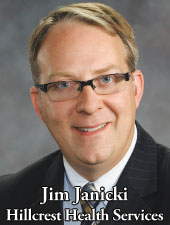 Jim Janicki of Hillcrest Health Services advises, “I would highly recommend that any caregiver who is managing the care of a loved one with dementia seek help and support. You cannot do this alone. Attend a support group, and at least look into respite care to give you a much-needed break from caregiving before your own health suffers greatly. Caregivers need to re-charge their batteries often. Hillcrest offers the region’s largest Dementia Support Group on the fourth Thursday of each month with Hillcrest’s Director of Education, Dr. Anna Fisher, who is one of the nation’s leading experts in dementia care. She recently was given the Champions Award by the Alzheimer’s Association and she authored two articles this year in McKnight’s Long-Term Care News at the editor’s request. All 800 of Hillcrest’s team members have received Dr. Fisher’s dementia training – it’s part of our system-wide onboarding program for all team members to have an understanding of Alzheimer’s and dementia, as well as their impact on our clients. About 50 people attend to hear Dr. Fisher and her guest speakers, with a major focus on education. For details, visit the events section on the hillcresthealth.com homepage.
Jim Janicki of Hillcrest Health Services advises, “I would highly recommend that any caregiver who is managing the care of a loved one with dementia seek help and support. You cannot do this alone. Attend a support group, and at least look into respite care to give you a much-needed break from caregiving before your own health suffers greatly. Caregivers need to re-charge their batteries often. Hillcrest offers the region’s largest Dementia Support Group on the fourth Thursday of each month with Hillcrest’s Director of Education, Dr. Anna Fisher, who is one of the nation’s leading experts in dementia care. She recently was given the Champions Award by the Alzheimer’s Association and she authored two articles this year in McKnight’s Long-Term Care News at the editor’s request. All 800 of Hillcrest’s team members have received Dr. Fisher’s dementia training – it’s part of our system-wide onboarding program for all team members to have an understanding of Alzheimer’s and dementia, as well as their impact on our clients. About 50 people attend to hear Dr. Fisher and her guest speakers, with a major focus on education. For details, visit the events section on the hillcresthealth.com homepage.
He adds, “Hillcrest Health Services is one of the region’s leading providers of memory support services for aging adults. Services range from secure memory support assisted living on three campuses in Sarpy County, secure long-term care services, Sarpy County’s only Adult Day Services program and in-home private duty care services offered in nine counties in Nebraska and Iowa. There are many different forms of dementia. Understanding the different types and the effects they have on those afflicted with the disorder helps our team members craft individualized care plans to meet needs and vastly improve quality of life.”
By 2050, the number of people age 65 and older with Alzheimer’s disease may nearly triple, from 5 million to as many as 16 million, if no advances have been made to slow or stop the disease. This impact on us as caregivers is huge as well as the sheer cost of care. In 2013, 15.5 million family and friends provided 17.7 billion hours of unpaid care to those with Alzheimer’s and other dementias—care valued at $220.2 billion. This takes a huge toll on families of those with dementia and causes a ripple effect—due to the physical, emotional and financial burden of being a caregiver, these folks had $9.3 billion in additional health care costs of their own in 2013. This is by far the most expensive condition in the nation, and will likely affect each and every one of us at some point in our lives. There are so many dedicated professionals and local resources available to help you navigate through this journey, and we encourage you to reach out, educate yourself, and be proactive in planning for yourself or your loved ones.

